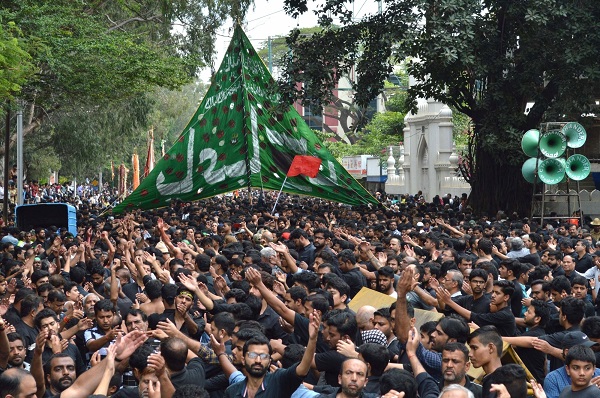Hyderabad, (Samajweekly) Perhaps for the first time in over 400 years, there will be no traditional “Bibi ka Alam” procession on 10th of Muharram in Hyderabad.
With the Telangana High Court on Thursday refusing permission for the annual event in view of Covid-19 pandemic, the old city of Hyderabad will miss the historic procession taken out every year on ‘Yaum-e-Ashura’ or 10th day of Muharram.
Thousands of Shia Muslims take part in the procession every year to mark the martyrdom of Imam Hussain, the grandson of Prophet Muhammad, in the battle of Karbala in 681 A.D.
With religious gatherings remained banned under the Covid guidelines of the Union Ministry of Home Affairs, the court refused to give permission for the procession.
“Yaum-e-Ashura’ is scheduled to be observed on August 30.
‘Bibi ka alam’ (standard) is carried on a caparisoned elephant as the procession with hundreds of self-flagellating mourners pass through parts of the old city including historic Charminar while thousands of people, standing on either side of the procession route, pay their respects.
The leaders of Shia community had urged the Telangana government to allow the procession and had even moved the court. Shia leaders say the tradition was being followed for over four centuries and hence demanded that the authorities allow them to continue this.
Bibi ka Alam is said to contain a piece of the sacred wooden plank on which Syeda Fatima, the daughter of Prophet Muhammad and mother of Imam Hussain, was given her final ablution before burial.
It was said to have been brought from Iraq to Hyderabad during the Qutub Shahi period.
The court, however, permitted carrying out of the alam on the condition that only 12 people will accompany it.
“I have filed an affidavit in the court, submitting 12 names. The alam will be carried in a vehicle and not on elephant,” said Maulana Syed Waheeduddin Hyder Jaffery.
He said the court made it clear that a procession can’t be taken out. It asked Hyderabad Police Commissioner Anjani Kumar to ensure that the conditions laid down by the court are followed by the organisers.
“If the court order is violated, the Police Commissioner will be authorised to take action,” he said.
The Shia leader appealed to the community members to do ‘matam’ (mourning) in ‘ashur khanas’, or community spaces where Shia Muslims gather for mourning during Muharram, or at their respective homes.
Installation of alams at ashur khanas will be allowed and people are being permitted to make the offerings while maintaining social distancing.
Telangana has 11,866 ashur khanas, majority of them in Hyderabad. Some of these were built by Qutub Shahi rulers.
The Badshahi Ashurkhana, the oldest in Hyderabad, was built in 1594 by Mohammed Quli Qutub Shah, three years after the construction of Charminar, the symbol of Hyderabad.
At a meeting called by Telangana’s Minorities Welfare Minister Koppula Eshwar to discuss Muharram arrangements early this month, Shia leaders and legislator belonging to the All India Majlis-e-Ittehadul Muslimeen (AIMIM) had demanded that the centuries old tradition should not be disturbed.
The officials, however, argued that the procession with elephants may attract large gathering.
Last month, the authorities had not permitted Bonalu procession in the city in view of the Covid protocol.
Every year, the traditional Bonalu procession is taken out on a decorated elephant, carrying ‘ghatams’ of Goddess Mahankali from Akkanna Madanna temple.
As no permission was given for gathering of devotees, people celebrated the festival at their homes. Five persons from the temple carried the ‘ghatam’ in an auto-rickshaw from the temple and performed the annual rituals.










